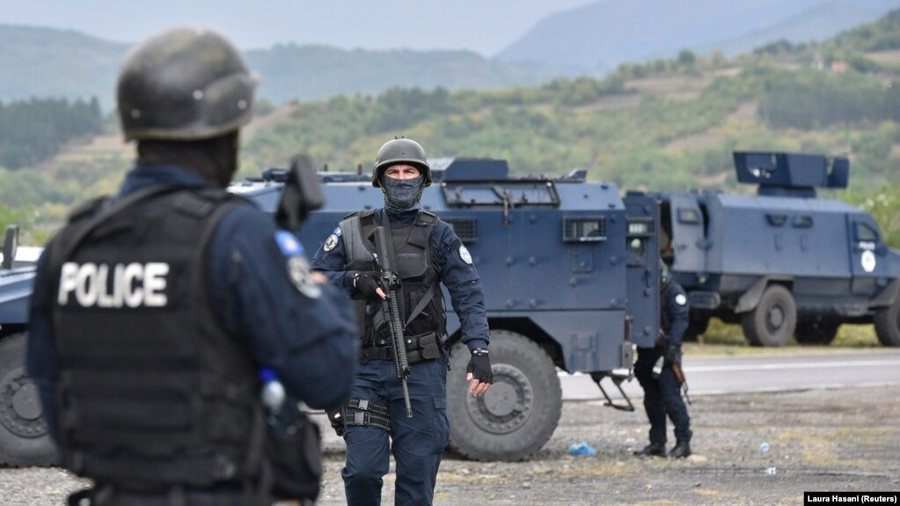
Kosovo’s acting Minister of Internal Affairs, Xhelal Sveçla, announced that authorities had detained 16 people, saying that among them were “active officers of Serbia’s security services.” Meanwhile, Serbian President Aleksandar Vučić said that the detained people were visiting monasteries around Prizren.
Through a Facebook post, Sveçla said that their detention was carried out during an operation conducted on April 5 and 6, adding that the detainees were traveling in four separate vehicles with license plates from Kragujevac, a city in Serbia.
The first group, according to him, consisting of four people, was detained in Gjakova. Meanwhile, 12 other people were detained in Prizren.
"According to initial data, it is suspected that these groups aimed to collect information on potential targets, as evidence of connections with Serbian military intelligence structures as well as members of the Banjska terrorist group has been found," Svečla wrote.
According to him, the first group detained in Gjakova, who were given a 48-hour detention order, were found with "photographs with a map of the Republic of Kosovo, photographs of terrorists killed during the attack in Banjska, two knives, an axe and a rotating light" during a search of the car they were traveling in.
The Kosovo Police has also reported on the detention of four people in Gjakova, but this case was also mentioned in the announcement for the Kosovo Security Council meeting, held on Sunday.
Acting Minister Sveçla, meanwhile, claimed that the 12 people detained in Prizren were "taking shelter in the Bogoslavia Orthodox Seminary."
"Also in this group were two active officers of the Serbian security services," said Sveçla.
On the other hand, the President of Serbia, Aleksandar Vučić, said that the detained persons had gone to visit the Theological Seminary and monasteries around Prizren.
"Imagine, some of these people are also members of the security structures, and then they find, say, a knife and a broken axe - it is completely clear that they are not used for anything other than some private use and personal needs," Vučić said on April 6.
"And, this shows you what terror is continuing against Serbs," he added.
The head of the Kosovo Ministry of Interior, meanwhile, stated that based on preliminary investigations by Kosovo law enforcement agencies, one of the detainees has been "confirmed to be a Serbian police officer with the rank of police lieutenant", who, as Sveçla claimed, "has close family ties with the member of the Banjska terrorist group, Nemanja Radivojević, nicknamed 'Gandhi'".
"The latter is a close associate of Vladimir Radivojevic, nicknamed 'Mami', who is the main suspect in the murder of Kosovo police sergeant Afrim Bunjaku. The other military officer, who holds the rank of captain first class, is a connection to former Serbian military intelligence general Jovan Milanovic, known for his involvement in leaking NATO data before bombing Serbian targets," Svecl said.
The name of Vladimir Radivojevic has been mentioned previously by Kosovo authorities, and has been linked to the attack in Banjska, Zvecan, against the Kosovo Police, carried out in September by a group of armed Serbs.
On September 29, 2023, Kosovo Police raided Radivojević's house in Zvečan. He is believed to be the leader of a group of fans of the Crvena Zvezda football club.
The raids on Radivojevic's house were carried out in the same police operation, when the properties of Milan Radojicic, the former deputy leader of the Serbian List, the largest Serb party in Kosovo, which enjoys the support of Belgrade, were raided.
Radoićić has claimed responsibility for organizing and participating in the attack in Banjska, Zvečan, in which police officer Afrim Bunjaku was killed. During the exchange of fire in the Banjska Monastery, three other Serb attackers were also killed.
According to Zveçla, the fact that the second group – which was stopped in the latest action – was “sheltered in the Bogoslavia Orthodox Seminary may indicate an attempt to use religious institutions for camouflage or to cause interethnic/religious tensions in Kosovo, using fabricated events to incite violent reactions or unrest.”
However, this claim by Sveçla has been opposed by the Diocese of Raska and Prizren.
The diocese said it learned from the media that people who were guests of the Seminar the previous night were present, emphasizing that the Church cannot have knowledge of who all the pilgrims who participate in services or even in this seminar are.
"Any insinuation that the aforementioned persons, while staying in the guest section of the Seminar, allegedly used the 'religious institution to mask and incite interethnic and religious tensions in Kosovo', as stated in today's Kosovo Police statement, is completely irresponsible and not based on concrete facts," said the Diocese of Raška and Prizren.
Tensions between Kosovo and Serbia have escalated since April 2023, when new Albanian mayors were elected for four municipalities in the north, inhabited by a Serb majority. Their election sparked protests from local Serbs.
Tensions peaked in September of that year, with the armed attack in Banjska, which Kosovo considers a terrorist attack.
Indictments have been filed in Kosovo in the Basnjka case against around 40 people, including Milan Radoicic. He and most of the group members are believed to be at large in Serbia, while Vladimir Tolic, Blagoje Spasojevic and Dusan Maksimovic are in custody in Kosovo.
They were arrested after the attack in Banjska, and the first hearing in their case will be held on April 17.
Serbia is also investigating the attack in Banjska, but so far no indictments have been filed.
The international community has strongly condemned this attack and demanded that the participants face justice.
Also, last year, the Iber-Lepenc canal in the north was attacked with explosive devices. Kosovo has blamed Serbia for both attacks, but Belgrade has denied any involvement. /REL (A2 Televizion)











